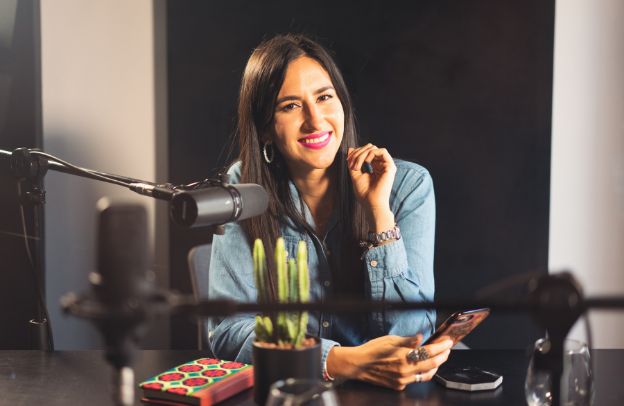How to Leverage Your Personal Stories in Podcasting

Do you want to learn how to leverage your personal stories in podcasting? Then pay attention because this article will show you how personal stories can be used in podcasting and how to make them more engaging and personal. Your personal stories are a great way to create a connection with your audience, which is why they are often used in podcasts.
Download the first chapter of The Storytelling Series: Beginners’ Guide for Small Businesses & Content Creators by Obehi Ewanfoh.
Podcasts have become an increasingly popular medium for people to consume content and it’s only just starting. They are also a great way to share your story, which you might not be able to do through most other mediums.
What is a personal story?
Personal stories are the most powerful tool for connecting with an audience. They are powerful because they give a voice to our personal experiences and emotions, which we often forget to share. Personal stories can also be used as a way of bridging the gap between people and cultures.
A personal story is a narrative of one’s experiences which are usually told in first-person prose (through the eyes of the writer).
Even though writing fiction is a part of this, a personal narrative can take on other forms such as poetry and memoir prose.
Different Ways to Incorporate Personal Stories in Your Podcasts
There are many ways to incorporate personal stories into your podcast. You can do it by interviewing people, reading personal essays, or even asking your audience for their own personal stories.
Many people write about how they have been struggling with a certain topic. For example, there are many different perspectives on mental health and how to destigmatize it.
You might ask someone whether they personally struggle with anxiety or depression and what they have experienced. This is also a way to explore the stigma of these conditions, as well as how to overcome the feelings.
Some of the most popular ways to incorporate personal stories into your podcast are:
- Interviewing people – This is a great way to get new perspectives on topics that you are discussing in your podcast.
- Reading personal essays – Personal essays are a good way to introduce a topic that you want to discuss in depth.
- Ask your audience for their own personal stories – This is one of the easiest ways to get content ideas from the audience and make sure that they are not just telling you what you want to hear.
What are the Best Practices for Podcast Storytelling?
Podcasting has been around for a while but it is still in its nascent stage. It has a lot of potentials and the growth is only expected to increase in the coming years.
There are many ways to tell stories through podcasts, but here are some best practices for personal storytelling in podcasts.
- Tell your own story: Podcasts are meant to be personal, so it’s important that you tell your own story on your podcast.
- Don’t overstrain yourself: While there might be many people who want to share their stories with you, try not to put too much pressure on yourself by interviewing too many guests at once or by trying to cover too much ground quickly.
- Bring your experiences to life: Your podcast should be about you and what you have learned from the experience of being a guest on someone else’s show as well.
Other things you can consider in your podcast storytelling are as followed:
- Create a story arc. The story arc should be connected from start to end with a clear beginning, middle, and end. This will help listeners feel invested in the podcast and want more episodes.
- Keep it short. Longer podcasts are often boring because they don’t have enough time to develop their characters or plot points. Keeping podcasts short helps maintain momentum and make sure listeners don’t get bored easily.
- Have an interesting opening line that hooks your audience right away so they are already engaged before you even get to what you’re going to say.
Podcast storytelling is a highly effective way to create content that can be consumed by a large audience. It’s also one of the most cost-effective ways to create content for your brand.
Tips on How to Write an Effectively Narrated Podcast Story
Podcasts are a great way to tell stories. They are a popular medium for entertainment and education. The first step in creating an effective story is to have a good idea of what you want your listeners to get out of it. This is where the concept of the story comes into play.
Narrative podcasts have one of the strongest bonds with their audience and provide a tight, emotional experience. They keep engaging and contextualizing their listener in every episode.
Have you ever listened to a great Narrative podcast? Then you should understand that it can easily transport audiences into a great experience. These can be true stories, fictional narratives, or something else entirely.
These programs tell stories to give listeners an experience that they will enjoy and which may be therapeutic in some way. Here are the best practices on how to write effective podcast storytelling:
- Keep the story short, around 7 to 10 minutes long or less,
- Use short sentences that are easy to understand,
- Avoid using too many adverbs and adjectives in your narration to avoid sounding like you are trying too hard,
- Use active voice, when possible, as it’s easier to follow along with and is more engaging than passive voice,
- Don’t use slang or colloquialisms unless they have a specific meaning in the context of the story,
- Don’t use words that aren’t commonly used in your target audience’s language.
What personal stories do you have that could be made into your podcast shows?
As a content writer, I am always looking for good stories that can be turned into podcasts. When I was in college, I had a professor who made us interview people on the street to get their stories.
One of the stories was about a guy who had just been released from prison and he wanted to help other people in his situation.
That is only an example, but you can literally turn any experience or story of yours into a podcast episode.
Every person has a story to tell. A story that could be made into a podcast show. Whether it is about your childhood, your family, or your life experiences, there is a story behind every person.
Say, for instance, my story to be made into a podcast show is “how My father struggled with addiction and how he went through the struggle to get sober and stay sober for over 20 years.”
That simple story can easily be broken into two podcast shows. The first story could be about how my dad struggled with addiction and how he finally got sober after 20 years of trying.
The second story can be about the struggles he went through while staying sober to make sure that his kids would not go through what he went through, growing up in an addicted household.
Create a podcast with your own personal stories and interviews
Podcasting is a new medium that allows people to share their personal stories, experiences, and thoughts. It is a way for people to express themselves without the fear of being judged.
There are many ways to create your own podcast. You can use your smartphone or a professional recording device. The most important thing is to make sure that you have enough material for your podcast episodes and that you know how to tell your story in an interesting way.
Podcasting is a way to reach an audience and promote new ideas, products, or personal brands. There are many benefits, such as building an audience over a long period of time and connecting with like-minded people. It can be really fun too!
Being able to share your story, or talk to experts in your field is incredibly powerful and helpful for building relationships with potential customers.
Many people want to find supportive communities to share their stories. Sharing your story is a way of connecting with others in your field. If you know what you are doing, you can equally make a lot of money doing this.
For more about how to make money, with your podcasting, you can check out our previous articles on Podcast Monetization.
Conclusion on how to leverage your personal stories in podcasting
Stories are important in podcasting. They help us understand each other and the world around us. When you are just getting started in the world of storytelling, it can sometimes be difficult to know where to start. Here are a few quick tips that will help you tell your story more effectively and engage your audience in a meaningful way.
- The first tip is to be yourself. You don’t need to be a professional or an expert; you just need to be yourself and tell your story.
- The second tip is the importance of authenticity. Your podcast will resonate more if it’s told from your point of view, not someone else’s point of view.
- The third tip is to make sure that you are telling your story in the right format for a podcast.
Personal stories are some of the most powerful tools that you have in your arsenal when it comes to podcasting and marketing yourself to the world. They will help you connect with more people on a personal level, which is why they are essential for your success in podcasting.
Download the first chapter of The Storytelling Series: Beginners’ Guide for Small Businesses & Content Creators by Obehi Ewanfoh.





